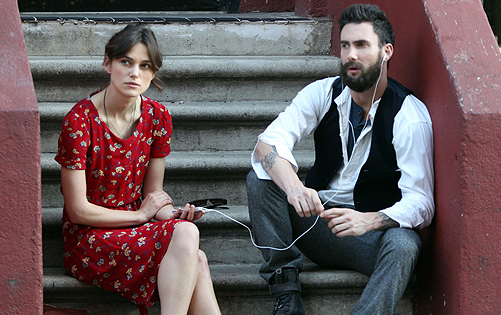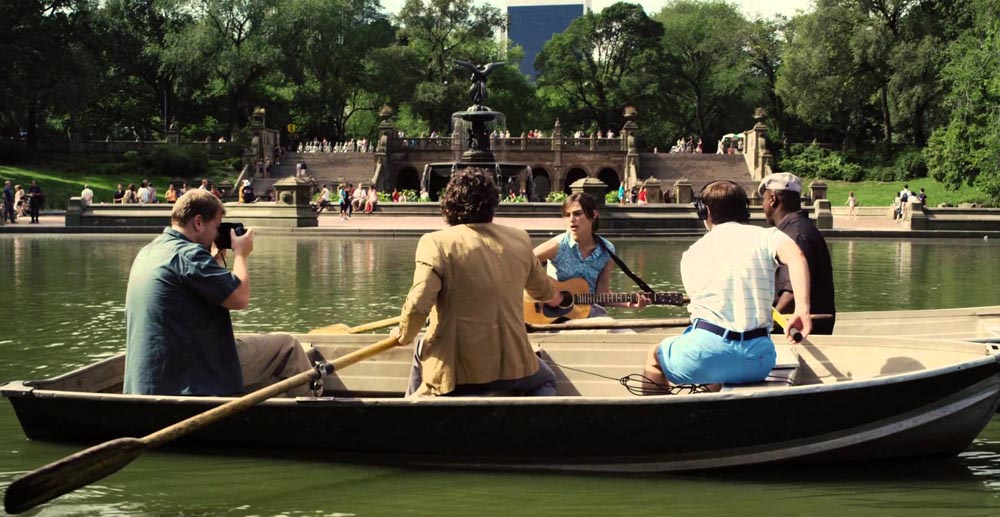Coming-of-agers, of which we’ve seen an awful lot recently, focus on a turning point in a child’s life: not so much the moment they transition from child to adult as the moment a child is first drawn into the adult world - retreat might be possible but they emerge from the experience changed. Boyhood, from the ever ingenious Richard Linklater, offers a genuinely fresh and truly ambitious twist on this cinematic staple.

Perhaps the most surprising - and certainly the most moving moment - of the 2014 British Academy Film Awards was the awarding of Outstanding British Contribution to Cinema to Peter Greenaway. Surprising, not because this wasn't colossally deserved (and in keeping with tradition it was of course announced ahead of the event), but because our most idiosyncratic and subversive auteur has fallen out of fashion in recent years: a 2011 Time Out poll listing the "100 Best British Films" as chosen by industry experts, sadly saw not a single one of his works placed.

Movies about the music industry often end up being bombastic or twee or merely idiotic. This one, written and directed by John Carney (who made 2006's not entirely dissimilar Once), picks its way carefully around the pitfalls to tell a story of love, loss and pop songs with sweetness and wit.
You wouldn't automatically visualise Keira Knightley as Indie Pop Girl, but she steps up winningly as Greta, a budding songwriter who prizes her music and doesn't want it prostituted on TV talent shows or bastardised to fit marketing strategies. She's in a seemingly idyllic (uh-oh) relationship with Dave - played by Maroon 5's frontman Adam Levine (pictured below right with Knightley) - who's also a budding songwriter, but one who's far more ambitious and career-minded. He has bagged himself a big-label deal and is whisked off to California, where the seductions of the rockbiz lifestyle swiftly drive a wedge between him and Greta.
 Happily, back in New York, Greta has her buddy Steve to lean on. He's a schlubby, shambolic songwriter himself (a role comfortably filled by James Corden), and he arm-twists Greta into singing one of her songs at one of his club gigs. Her performance is nervous and hesitant and most of the crowd end up gossiping among themselves. Except one onlooker - it's dishevelled Dan (Mark Ruffalo), a label boss on the skids. He detects big potential in Greta's song, and in a whimsical but effective scene, he visualises musical instruments magically playing themselves to provide a full-scale arrangement.
Happily, back in New York, Greta has her buddy Steve to lean on. He's a schlubby, shambolic songwriter himself (a role comfortably filled by James Corden), and he arm-twists Greta into singing one of her songs at one of his club gigs. Her performance is nervous and hesitant and most of the crowd end up gossiping among themselves. Except one onlooker - it's dishevelled Dan (Mark Ruffalo), a label boss on the skids. He detects big potential in Greta's song, and in a whimsical but effective scene, he visualises musical instruments magically playing themselves to provide a full-scale arrangement.
The narrative evolves around Dan mentoring Greta through her debut album, which is done in guerrilla style by performing the songs at locations all over New York. With Steve as ad-hoc sound engineer and a handful of musicians in tow, they pop up on rooftops and alleyways, in subway stations and on the lake in Central Park (pictured below), cutting the tracks live. It's a hymn to the landscapes and characterful low-life of the city as much as an ode to free-spirited music-making done the old-fashioned way. The story of musical discovery is organically entwined with the themes of self-knowledge and personal growth, though you hope Carney would recoil in horror from such prescriptive terminology. The story makes a perfect vehicle for some sly jabs at the music industry. Dan has a habit of auditioning CDs sent in by musical wannabes while driving around town in his beat-up old Jaguar, and ends up chucking all the discs out of the window in disgust. Meanwhile he's drinking himself through a failing relationship with music journalist Miriam (Catherine Keener), and another failing relationship with the corporate label run by Saul, who's played by hip-hopper Mos Def (using the stage name Yasiin Bey) with comically deadpan cynicism. Saul can be relied on to prioritise a fast buck and a novelty hit over musical worth or an artist's long-term career, which makes him anathema to Dan. Another treasurable turn comes from Cee Lo Green as the outsized, blinged-up Troublegum, who generously repays Dan for the boost he gave to his own career.
The story makes a perfect vehicle for some sly jabs at the music industry. Dan has a habit of auditioning CDs sent in by musical wannabes while driving around town in his beat-up old Jaguar, and ends up chucking all the discs out of the window in disgust. Meanwhile he's drinking himself through a failing relationship with music journalist Miriam (Catherine Keener), and another failing relationship with the corporate label run by Saul, who's played by hip-hopper Mos Def (using the stage name Yasiin Bey) with comically deadpan cynicism. Saul can be relied on to prioritise a fast buck and a novelty hit over musical worth or an artist's long-term career, which makes him anathema to Dan. Another treasurable turn comes from Cee Lo Green as the outsized, blinged-up Troublegum, who generously repays Dan for the boost he gave to his own career.
Carney's message is be true to yourself, in life or in music. Dave's hopes of a reunion with Greta are seriously jeopardised when he plays her the hilariously over-produced tracks from his own album, while lo-fi tunesmithery guides Greta and Dan to the understanding that they're kindred spirits. Even though the plot comes unstuck once or twice and we could probably have managed without Dan's schematic teenage daughter Violet (Hailee Steinfeld), this is a truly lovable movie.
Overleaf: watch the trailer for Begin Again

Digital Revolution begins with an archive section taking you back to the 1970s when Ralph Baer developed a video game allowing punters to play ping pong on TV (below right: poster for the original Pong arcade game) and Steve Jobs worked on Break Out, in which a virtual ball bounces off a bank of horizontal lines.

An anonymous voice screams “Please stop” over the opening credits of Noel Clarke’s sci-fi thriller and after about fifteen minutes of watching it those words are sure to haunt your thoughts, as this dull slog runs out of ideas far too quickly for it to sustain any semblance of tension or real worth. This is Clarke’s third endeavour in the director’s chair - after Adulthood and 4.3.2.1 - and it’s a disappointing and confused effort that relies on the outdated Hollywood action formula to pull its narrative along.

Melissa McCarthy has been one of the decade's most notable comic finds. Although she's been plugging away for years on TV, as a stand-up, in sketch troupe the Groundlings and in various supporting roles, it was Bridesmaids and The Heat which brought her much deserved attention - including an Oscar nomination for her part in the former. More than just comic fodder, these characters were tough (but sensitive), smart and sisterly women railing against preconceptions and prejudice.

Despite the profusion of slapstick jappery, explosions, a whimsical veneer and cartoonish portrayals of its characters, The 100-Year-Old Man Who Climbed Out of the Window and Disappeared is not a film aimed at children. The Swedish blockbuster also includes castration, explicit violence, death by being locked in a freezer and near-the-knuckle racial categorisation. Balancing the picaresque and the macabre, the film ends up as neither one nor the other, or a harmonious hybrid. Although intermittently funny, it is not the sum of its parts.

Women everywhere may start cutting loose in their kitchens after seeing Goddess, a sweet if slight Australian film that suggests a hybrid of Mamma Mia! and Shirley Valentine. Adapted (and greatly expanded) from a solo play written and performed by co-screenwriter Joanna Weinberg, the film's terrain is sure to hit many distaff moviegoers where they live, whether or not they find themselves displaced to Tasmania with a former boyband star (in this case, Ronan Keating) as their often-absent husband.

It’s not unusual for Jon Favreau to go small, despite his reputation for the big hits such as Iron Man, Iron Man 2 and Elf. There was the much-touted squib Cowboys & Aliens alongside the nifty minnows of Made and Very Bad Things. Favreau loves acting and making movies so much that he’s a realist when things go wrong.

Two brothers who are at polar opposites, one an indie rock star, the other a heavy-metal loving, B-movie making slacker who still lives at home with his parents and is longing to find his place in the world, are at the centre of this gleeful, touching and manic rockumentary about The National. The band consists of two pairs of brothers, Aaron and Bryce Dessner, Bryan and Scott Devendorf and lone front man Mat Berninger who in a bid to support his younger brother invites him on tour to work as part of the crew.

